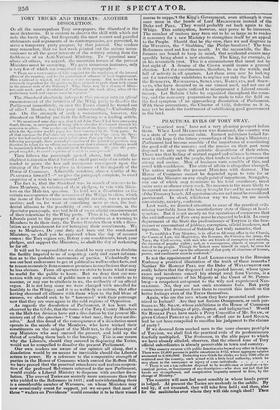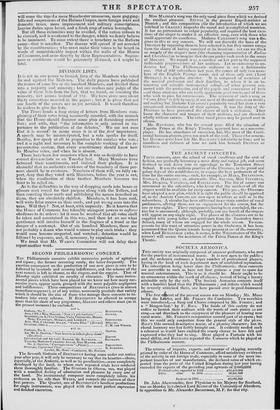PRACTICAL EVILS OF TORY SWAY.
TIIE " practical men " have not a very pleasing prospect before them. When Lord MELBOURNE was dismissed, the country was in a state of very unusual calm. Earnest politicians looked for- ward with hope to the future proceedings of the King's Ministers; Parliament had become sensible of the importance of conciliating the good-will of time masses ; and the masses on their part were disposed to rely upon the patriotic dispositions of their rulers. There was that feeling of mutual regard and reliance between the men in authority and the people, that tends to make a government strong and secure. Men of business were sensible of this, and acted with confidence. The state of affairs is altogether changed. The nation regards time present Ministers with distrust. The House of Commons cannot be depended upon to vote for or against time Minister on any single point of importance. Struggles, any one of which may terminate in his total overthrow, must occur once or oftener every week. No measure is the more likely to be carried on account of its being brought forward by an occupant of the Treasury bench. All appointments are and must be considered provisional. In short, whichever way we turn, we see much uncertainty, anxiety, confusion. Last week, we directed attention to some of the practical evils arising inevitably from this unsatisfactory state of timings at head- quarters. But it is not merely on the operations of commerce that the evil influence of Tory sway must be expected to be felt. In every department of the State the predominance of Toryism is the fore- runner or concomitant of jobbing, corruption, official insolence, and injustice. The Scotsman of Saturday last truly remarks, that " To establish a Tory Ministry, is in effect to fill every office in the Church, the Courts of Law, the Magistracy, the Revenue, the Colonies, the Army, the Navy, the Civil service, with men who are friends of corruption and misrule, the enemies of popular rights ; and, as a consequence, objects of suspicion or hatred to the people. Though Sir Robert were himself an angel, he owes his station to a party ; and upon the adherents of that party all situations of honour, power, and emolument must be conferred."
Is not the appointment of Lord LONDONDERRY to the Russian Embassy a practical illustration of the truth of these remarks ? Neither Sir ROBERT PEEL nor the Duke of WELLINGTON can
really believe that the disgraced and rejected hussar, whose igno- rance and insolence caused his abrupt recal from Vienna, is a
fitting representative of his Majesty at the Court of St. Peters- burg—a competent antagonist to the wily and experienced NES- SELRODE. No, they are not such enormous fools. But party connexions and promises force them to commit this insult on the better feelings even of the Tories themselves.
Again, who are the men whom they have promoted and patro- nized in Ireland? Are they not furious Orangemen, or such par-
tisans as Mr. SHAW, whose exhibitions in the House of Commons excite mingled feelings of pity, disgust, and indignation ? Would Sir ROBERT PEEL have made a Privy Councillor of Mr. SHAW, or given Colonel PERCEVAL a place, or offered one to Lord RODEN, had he not been compelled to sacrifice his judgment to the claims of party ? If we descend from marked men to the more obscure protegits of Toryism, we shall find the practical evils of its predorninance fearfully multiplied. The Scotsman, in the able paper to which we have already alluded, observes, that the altered tone of Tory official subordinates is already perceivable in town and country. "This country swarms with public functionariesbeysnd any other in Europe. There were 21,000 persons in public situations in 1832, whose aggregate salaries amounted to 2,800,000/. Deducting two-thirds for clerks, we have 7000 offic,rs scattered over the country, each armed with a little brief authority, which he may abuse to the annoyance or injury of some individuals ..... . . " There is not a tax-collector disposed to be troublesome or insolent—a ty- rannical justice, or functionary of ally description—who dues not feel that his hands are strengthened, and comparative impunity secured to him, by the change of Ministry."
The country will soon feel most sensibly in whose hands power is lodged. At present the Tories are unsteady in the saddle. By and by, if not unseated, they will take firm hold; and then, alas for the multitudes over whom they will ride rough-shod! Then will come the time for more Manchester massacres, more gagging- bills and suspensions of the Habeas Corpus, more foreign wars and domestic taxes, more impressment and military conscriptions, heavier duties upon bread, and a fresh crop of rotten boroughs.
But all these calamities may be avoided, if the nation refuses to be cheated, and is awakened to the danger, which we firmly believe to be imminent. To some extent there is treachery in the Reform camp—that is manifest. The disease will spread if not arrested by the constituencies; who must make their voices to be heard in words of unmistakeable import within the walls of the House of Commons, and more directly by their Representatives. Supine- mess or confidence would be grievously ill-timed, and might be fatal.



























 Previous page
Previous page